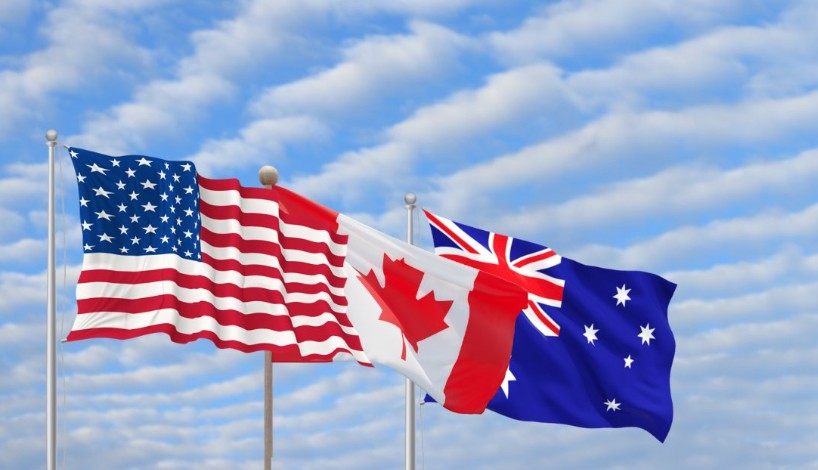
Visa exemptions for certain nationalities rei...
read more

Intense drought and heat threaten riverside communities and ecosystems and hinder brown water navigation
The Amazon is the rainiest region in Brazil, with a distinct climate and peculiar rainfall regime. Although it is winter throughout the Southern Hemisphere between June and September, when the rest of the country sees the lowest average temperatures, the Amazon rainforest experiences its hottest and driest time, typically lasting from July to November. Because of the below-average rainfall in the region during this period, locals call it the “Amazon Summer”.
While drought in the Amazon is a recurring natural feature, with seasonal restrictions on river navigation being reasonably predictable, the frequency and intensity of this intricate climate phenomenon have increased in recent decades. This year, intense drought and extremely high temperatures are about to reach unprecedented levels.
Major navigable rivers, especially those in the northern states of Acre, Amazonas and Rondônia, such as the Madeira, Rio Negro, and Solimões, continue to fall to alarmingly low levels, affecting wildlife and the livelihoods of riverside communities whose access to food, water and other essential supplies is increasingly restricted as the abnormally dry weather persists and worsens.
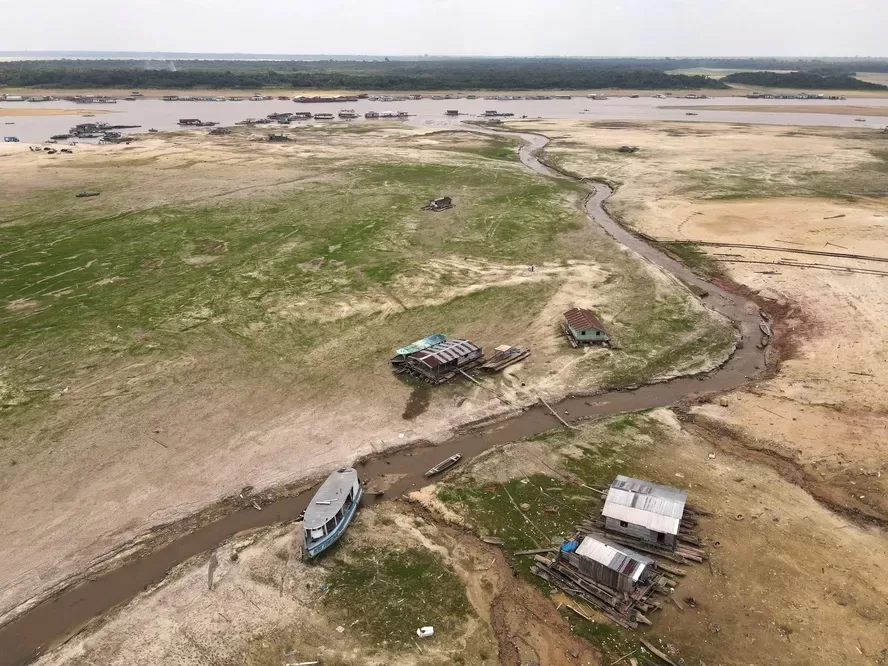
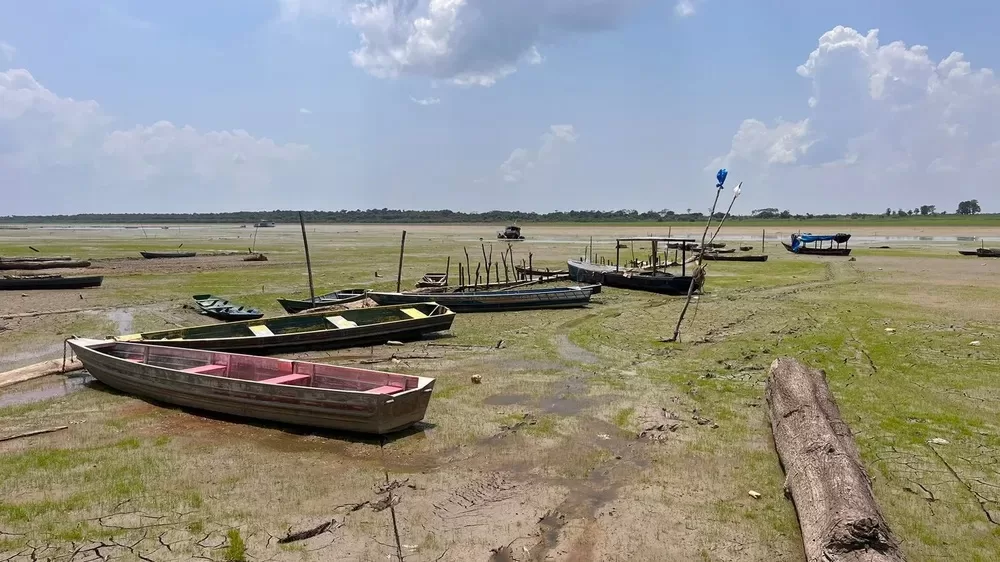
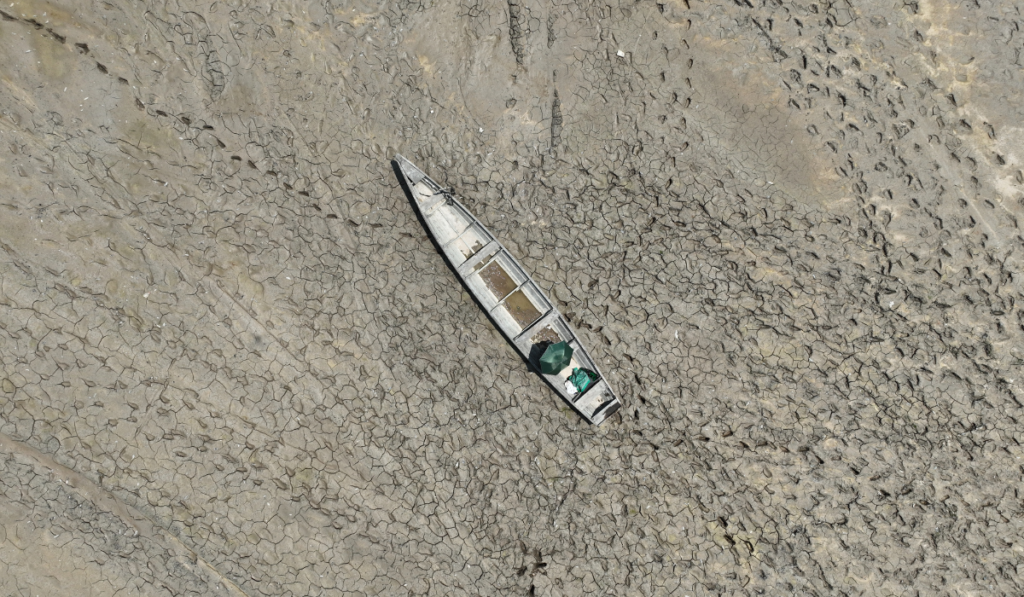
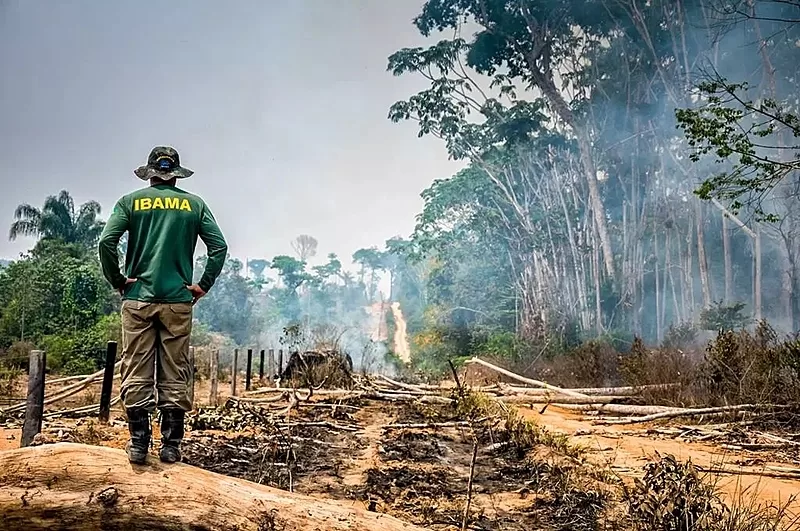
Civil Defence predicts that the extreme drought and heat will continue for several weeks, peaking in October and November, as there is no forecast of significant rainfall in the headwaters.
The drought harshly impacts the local economy and the well-being of riverine communities, whose subsistence is primarily based on fishing and family farming, as the rivers are their life support.
Given that roads are virtually non-existent in that part of the country, the mobility of the local population has been hindered due to the shallow riverways. Access to healthcare facilities, education and essential services remains limited. The school year ended earlier than anticipated in most cities, and small businesses were shut down in affected communities.
Due to contamination by dead fish and decomposing animals in rivers and lakes, the water supplies have been drastically reduced to the point where bottled drinking water and other supplies have to be brought piecemeal in small boats to provide for impoverished communities in remote locations.
Carcasses of dolphins and dead fish are seen in lakes and rivers where the temperature approached an astonishing 40°C. River mammals are stranded in shallow waters, many of them dehydrated and with injuries caused by the propeller blades of motorboats. Livestock is being lost in rural areas, where many communities remain isolated. Social media is filled with photos and videos of deceased wildlife, dried-up rivers and boats stranded in the mud where mighty rivers once flowed.
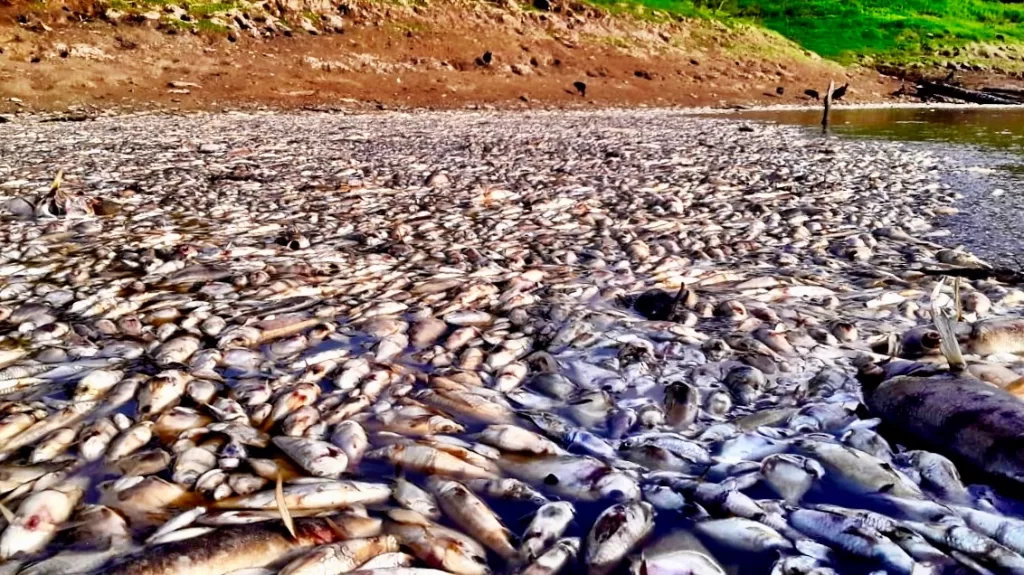
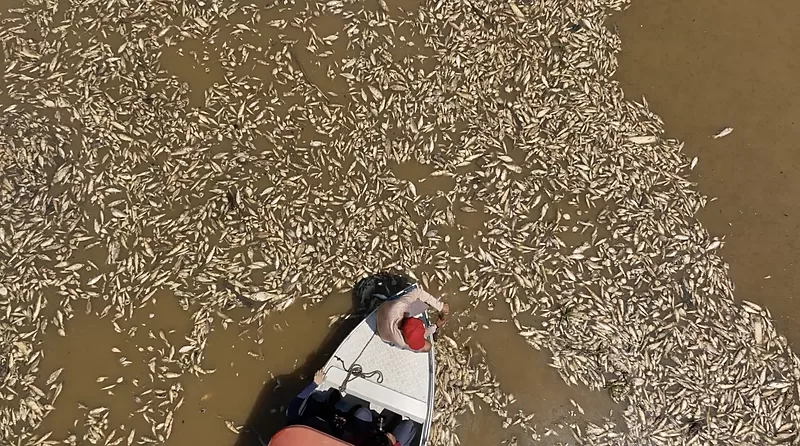
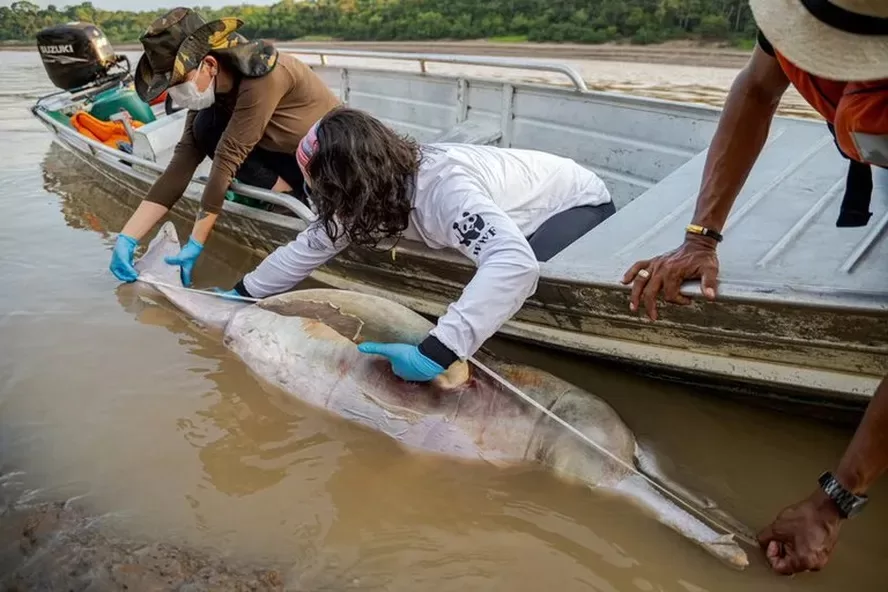
Ministry of the Environment’s Chico Mendes Institute for Biodiversity Conservation (ICMBio) set up a camp on the banks of the Solimoes River to rescue dolphins and other trapped animals. As the drought aggravates forest fires, ICMBio and the Institute of Environment and Renewable Natural Resources (IBAMA) mobilised firefighters to combat fire outbreaks in cooperation with local fire brigades.
Last week, the Madeira River, an essential link between barge stations in Porto Velho, in Rondônia, and the ports of Manaus and Itacoatiara at the confluence of the Negro and Solimoes rivers in Amazonas, hit its lowest level in the historical series, reaching a depth of just 1.43 metres in some stretches. Santarém, in the west of Pará, declared an emergency due to the lack of rain and the sharp drop in the level of the Tapajós River, which reached a 94-centimetre mark, 38 cm below the lowest level ever recorded, disrupting the traffic of barge convoys to and from Miritituba (Itaituba) barge stations.
Draft limitations also affect the supply of inputs to the Manaus industrial hub and the flow of manufactured goods from the Manaus Free Trade Zone to the rest of the country through cabotage.
Fuel distribution in the region is also impacted. Given the strategic importance of gasoline and diesel oil for motor boats and power generators in places without electricity, there is a fear of escalating fuel and cargo thefts from convoys and small ships, which are rife in the Amazon, as reported in this article. Adding to the concern is the halt of operation of the Santo Antonio hydroelectric plant along the Madeira River, the fourth largest in the country, due to low levels.
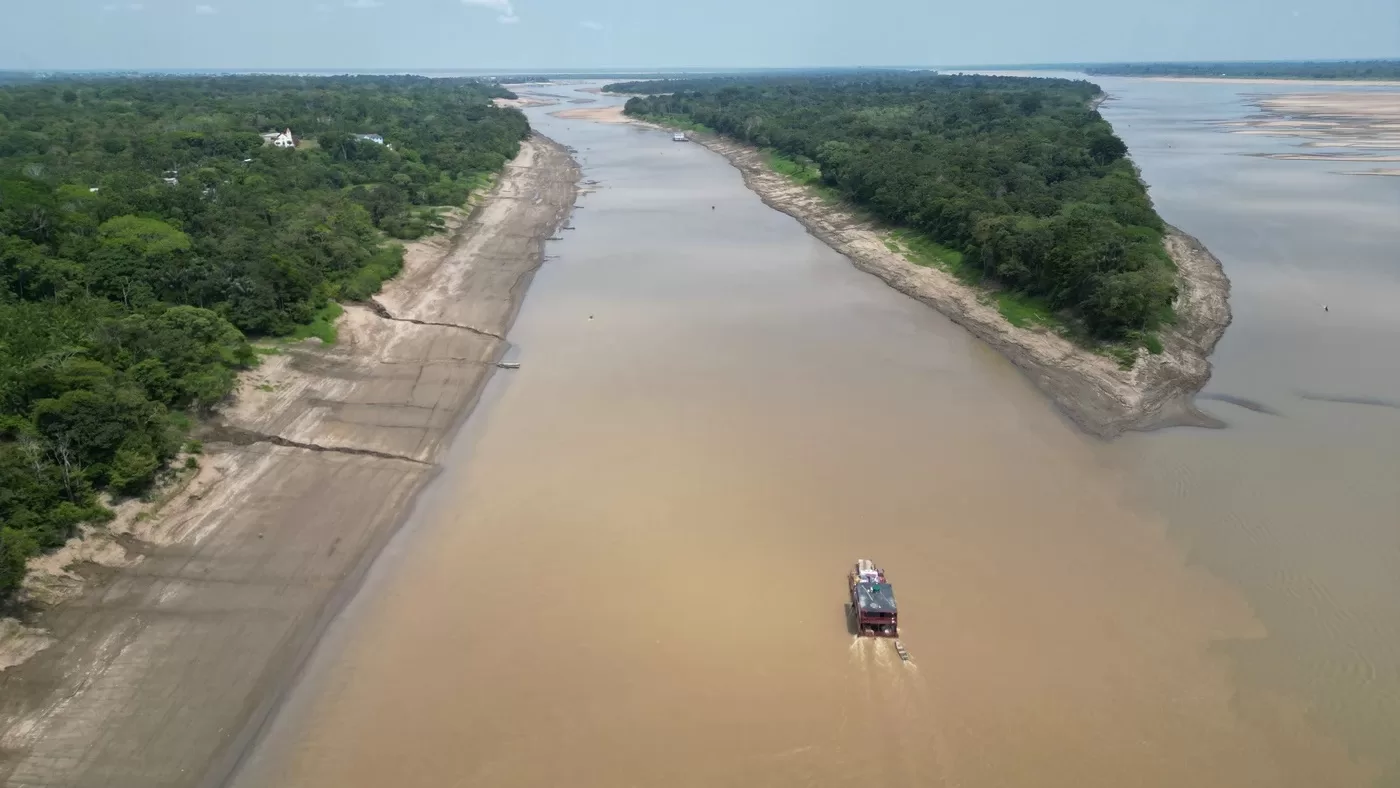
Although there is no significant agricultural production in the Amazon, the river ports of the Northern Arc, Itacoatiara, Santarém, Vila do Conde (Barcarena), Belém, and Santana in Macapá are strategic for agribusiness flowing shipments to markets in the Americas, Europe and the Middle East. These ports typically export grains, oilseeds and mineral products and handle imports of agricultural inputs and fuels.
Producers and traders are concerned that a longer-than-expected draught could restrain their ability to shift commodities down the rivers, particularly when the country is bound to have a bumper crop with record exports of soya beans and maize (corn).
The federal government estimates that the severe drought and heat have already affected at least half a million people in the Amazon, where a state of emergency has been declared in more than 55 municipalities. It created an interministerial task force to provide emergency assistance to drought-stricken populations.
Last week, the government allocated BRL 140 million (over USD 27 million) to emergency dredging to maintain the flow of transport of people and goods until the arrival of the flood season. During a recent visit to Manaus, a federal delegation led by the vice president of Brazil announced that the works would be carried out by the National Department of Transport Infrastructure (DNIT), with immediate effect, in critical sections of the Solimões and Madeira rivers and the Tabocal Passage. The emergency dredging is estimated to take 45 days.
Last August, when the dry season began earlier than predicted, the River Captaincy of the Western Amazon (CFAOC) issued Ordinance 158/CFAOC offering guidance and recommendations to vessels sailing on the Amazon in critical stretches of the Tabocal Passage, the mouth of the Solimoes River and the mouth of the Purus River, as follows:
Any obstacles to safe passage through critical river sections must be immediately reported to the maritime authority.
Experts speculate that global climate change and the natural phenomenon of El Niño, along with wildfires, deforestation (to clear land for grazing or logging) and illegal river mining, have exacerbated the severity and effects of this year’s drought.
The National Institute of Meteorology (INMET) and the National Institute for Space Research (INPE) issued a joint technical note explaining that the greatest lack of rain occurred in the central-north part of the Amazon, with pronounced rainfall below average registered in Manaus and Belém. The document indicates that the North and Northeast regions will continue to experience rainfall deficits, with an increased risk of wildfires throughout the Amazon, particularly in degraded areas, while the Southeast and South regions will have above-average rainfall from October to December.
Please read our disclaimer.
Related topics:
Rua Barão de Cotegipe, 443 - Sala 610 - 96200-290 - Rio Grande/RS - Brazil
Telephone +55 53 3233 1500
proinde.riogrande@proinde.com.br
Rua Itororó, 3 - 3rd floor
11010-071 - Santos, SP - Brazil
Telephone +55 13 4009 9550
proinde@proinde.com.br
Av. Rio Branco, 45 - sala 2402
20090-003 - Rio de Janeiro, RJ - Brazil
Telephone +55 21 2253 6145
proinde.rio@proinde.com.br
Rua Professor Elpidio Pimentel, 320 sala 401 - 29065-060 – Vitoria, ES – Brazil
Telephone: +55 27 3337 1178
proinde.vitoria@proinde.com.br
Rua Miguel Calmon, 19 - sala 702 - 40015-010 – Salvador, BA – Brazil
Telephone: +55 71 3242 3384
proinde.salvador@proinde.com.br
Av. Visconde de Jequitinhonha, 209 - sala 402 - 51021-190 - Recife, PE - Brazil
Telephone +55 81 3328 6414
proinde.recife@proinde.com.br
Rua Osvaldo Cruz, 01, Sala 1408
60125-150 – Fortaleza-CE – Brazil
Telephone +55 85 3099 4068
proinde.fortaleza@proinde.com.br
Tv. Joaquim Furtado, Quadra 314, Lote 01, Sala 206 - 68447-000 – Barcarena, PA – Brazil
Telephone +55 91 99393 4252
proinde.belem@proinde.com.br
Av. Dr. Theomario Pinto da Costa, 811 - sala 204 - 69050-055 - Manaus, AM - Brazil
Telephone +55 92 3307-0653
proinde.manaus@proinde.com.br
Rua dos Azulões, Sala 111 - Edifício Office Tower - 65075-060 - São Luis, MA - Brazil
Telephone +55 98 99101-2939
proinde.belem@proinde.com.br